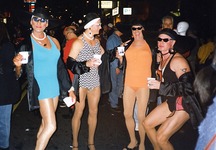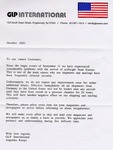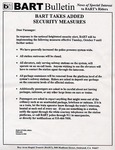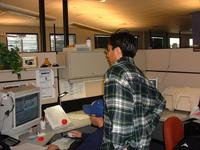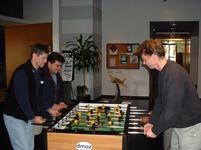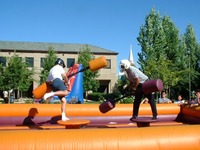 |
| Angelika/Mike Schilli |
Dear newsletter friends!
It's that time again -- Newsletter time! Today with the following topics: "Halloween", "Another Holiday: Thanksgiving", "The State of the Nation", "America After the Attack", "From the Good Old Days in Silicon Valley", "Home to Germany?", "Album of the Month" and "The Most Useless Sports Items in the World". Enjoy reading!
Angelika We have been following with surprise how American "Halloween" celebrations are enjoying growing popularity in Germany. According to rumors, on October 31st in Germany, there were not only Halloween parties but also children going through neighborhoods trying to collect sweets. Until now, I actually thought that there were enough holidays in Germany. I know that the festival dates back to the Celtic Druids, who celebrated the god of darkness on the night of October 31st to November 1st more than 2000 years ago, and that Christians later transformed the pagan custom into All Saints' Day. The festival eventually came to America with Irish and English immigrants in the mid-19th century.
Germany does not really celebrate Celtic traditions -- the whole thing seems more like "looking towards America" and commerce to me. Halloween costumes and all sorts of spooky masks seem to sell well in Germany too. What scares me the most, however, is the thought that we might one day live in Germany again and won't have to adjust much. How boring life is when you encounter the same thing everywhere! The big cities of this world already give a taste of that. Travelers encounter McDonald's and Kentucky Fried Chicken everywhere. Department stores in London, Paris, Berlin, Sydney, New York, and Hong Kong offer Levis, Calvin Klein, Esprit, Benetton, and the like. I don't even want there to be a GAP (an American clothing chain based in San Francisco) in Munich, or for the American coffeehouse chain "Starbucks" to make its way into Germany. Admittedly, I often miss various things here, like Bahlsen's peanut flips, but there's nothing more delightful for me than indulging in a bag during a visit to Germany or joyfully receiving a "care package" from Germany containing treats we can't get here. Feel free to think I'm a bit crazy. To anyone who doesn't believe this horror of uniformity actually exists, I recommend a tour through American suburbs. There, you mostly find shopping centers with the same stores. Everything is completely interchangeable, whether you're in California, Idaho, or anywhere else in the USA.
Once again back to "Halloween": The term is composed of the three words "All Hallows Eve," which means "the night before All Saints' Day." Here in the USA, children dress up in costumes and roam the streets, going from door to door or even from store to store, and threaten to "trick or treat" -- loosely translated: Either you hand over the candy, or we'll play a trick on you. A popular activity around Halloween is for American families to go to so-called "Pumpkin Patches" (pumpkin farms) and pick out pumpkins, which are then hollowed out and carved with funny or spooky faces. On Halloween, a candle is placed inside the hollowed-out pumpkin, making the face glow.
This year, even "Halloween" was overshadowed by the terrorist attacks in September. Many security experts expressed concerns about the crowds at various Halloween parties that took place on the streets of several cities on October 31st. As a result, many cities canceled their events. However, San Francisco was not deterred. For years, there had been a street party in the Castro, San Francisco's gay district, during Halloween. There, you can see not only the most amazing costumes, but the atmosphere is also truly lively. No one wanted to miss out on the fun. By the way, the party in the Castro district is unofficial. The city of San Francisco has been trying for some time to move the party entirely to Civic Center (where San Francisco's City Hall is located) because Castro Street is relatively narrow and can hardly accommodate the large crowds--there simply isn't enough space. So now the official party always takes place at the Civic Center, which no one seems to care about, and everyone goes to celebrate in the Castro.
The safety of Halloween is generally a constant topic in America, especially concerning children who go from door to door. Several years ago, a few completely deranged individuals hid razor blades in oranges that they gave to children at the door, so now only pre-packaged candies are being distributed. Stores sell candy in bulk before Halloween, and all the candies are individually wrapped. Many families who live in less safe neighborhoods (meaning: rough areas with burning trash cans -- Michael) drive with their children to safer areas and let them go door to door there. With the children in the Tenderloin (where I still volunteer twice a week), we always take the same route, as the Tenderloin is known to be one of the somewhat less safe areas in San Francisco. But even the candies that the business owners we know give to the children cannot be eaten immediately, as there is a rule that parents must first inspect the candies for safety reasons when they pick up their children. And it's not just about potential allergies. It's all very sad.
Angelika And now a few words from me on the State of the Nation: The Senate has now ratified the anti-terrorism laws here (I briefly mentioned it in my last newsletter). The package of laws has the resounding name "Uniting and Strengthening America by Providing Appropriate Tools Required to Intercept and Obstruct Terrorism," abbreviated as U.S.A. P.A.T.R.I.O.T., so you immediately know where the wind is blowing from.
The law significantly restricts many civil rights. And although civil rights are considered sacred in America and "too much" government is deeply suspicious to every American, there were hardly any critical voices heard, neither from politicians nor from the general public. In Congress, only 66 representatives voted against the law, with 356 voting in favor. In the Senate, there was only one opposing vote against 98 supporters.
Surveillance of phones and the snooping into private emails is easily accomplished and almost entirely beyond the control of the courts. No search warrant is required to search residences, and the searches can even take place in the absence of the residents. Bank and medical confidentiality practically no longer exist, or as Senator Feingold aptly noted: If you are merely sitting on a plane with a terrorism suspect, your own medical, bank, or business records can be scrutinized. The CIA, the American foreign intelligence service, is now also spying domestically. At the slightest suspicion that foreigners might be involved in terrorist activities, it is permitted to detain them for seven days without any evidence. This new regulation also includes holders of the American Green Card. Under certain circumstances, these seven days can even be extended to six months. The civil rights organization ACLU ("American Civil Liberties Union") considers it particularly dangerous how the new law defines terrorist organizations on domestic soil. The definitions are so broad and general that cynical voices claim even Greenpeace falls into this category. The anti-terror law contains a single bright spot: the extensive surveillance of phones and computers is initially valid for only four years.
A country that prides itself on its democracy undermines it significantly with such laws. President Bush's proposal to try terrorists before a military court also contradicts the principles of a democratic constitutional state. Military courts can take place away from the public eye, and the verdict does not need to be unanimous--a two-thirds majority is sufficient. The right to freely choose one's own attorney and the possibility for appeal are limited. It is also incomprehensible that the USA is vehemently opposed to an international court. This would provide the opportunity to prosecute terrorists in the future. The Bush administration justifies its opposition by arguing that there is a risk that American citizens would also have to answer before this court. Hmmm...
Recently, the topic of torture is being discussed again in America. According to a CNN survey, 45% of Americans support the use of torture as a means of pressure to obtain information about terrorism. It's truly unbelievable. We are living in crazy times. Almost every day, we hear a new anthrax story. Just today, a 94-year-old woman in Connecticut died of anthrax inhalation. However, the FBI is still in the dark about his case. That's why, at the beginning of November, they released a profile of the possible perpetrator. I used to only see things like this in Hollywood movies: The perpetrator is most likely male. He is a loner, both at home and at work. He finds it difficult to form relationships. He is familiar with the Trenton area (some of the anthrax-infected letters were sorted in Trenton post offices). He has a scientific background or a strong interest in science. He is knowledgeable in laboratory work. In fact, he prefers test tubes to people. Perhaps he is taking antibiotics ... whether this will help in the manhunt is unknown.
Michael Due to the tightened security regulations in air travel, the "Süddeutsche Zeitung," whose Friday edition we have subscribed to, unfortunately no longer arrives on time. As we recently learned from a note from distributor, the printed material now has to spend 24 hours in a compression chamber along with other air freight to ensure that the sharply written articles, with their concentrated journalistic impact, do not blow up an airplane. Oh man! Hopefully, the ladies and gentlemen at the FAA or whoever issues these ridiculous regulations will attend a proper security training session to distinguish between blind activism and sensible security measures. An excellent article by a security guru in the field of computing, Bruce Schneier, can be found here.
On the State Of the Nation
America After the Attack
BART, San Francisco subway system, is not far behind and closes all station restrooms for security reasons. Hmm, that will surely deter the terrorists. One gets the impression that many are taking advantage of the situation to abolish inconvenient things (like maintaining train station restrooms) or to push through previously blocked intrusions into privacy under the guise of "We need more security." At the airport, soldiers in camouflage uniforms and with long rifles are standing around. Well, at least they are safer than the Uzis (submachine guns) with which the German police made airports insecure in the early 70s at the height of the terrorism scare.
Since everyone is now afraid of receiving mail with anthrax spores, the American postal service has issued a flyer with instructions on how to inspect incoming mail. Is the mail from someone you don't know? Is it over-posted? Is there no return address? Then you should not open the mail, not shake it, not sniff it, but forward it to the appropriate authorities.
At the entrance to the Netscape campus, which consists of around 10 buildings, not only the Netscape "N" but also the AOL logo has been displayed since AOL acquired Netscape. By the way, Netscape only rented the buildings and recently gave up some of them. About a year ago, at the height of the dot-com bubble, the company Veritas agreed to lease them for $600 million for 10 years. Now, of course, the entire market has collapsed, and negotiations with the landlord have been reopened. It was agreed that Veritas could now purchase the buildings for $280 million. Imagine that, the buildings are changing hands for half of the originally negotiated rental price! Even the fountain with the Netscape logo, in front of which Netscape founder Marc Andreessen liked to pose for newspapers, was sold off: it is now adorned with the logo of the company "Verisign."
But enough of the gloomy predictions. Listen to your Silicon Valley maverick rambling on before everything finally collapses:
Between the beige buildings, there are park benches and fountains so that people can relax. Those whippersnappers! The new boss of Netscape is somehow 26 years old. And I always feel ancient when I look at my colleagues who have just graduated from university. Oh well, our youngens still have a lot to learn!
The dress code at Netscape is, of course, California casual. I don't think I've seen anyone wearing a tie in my four years here. In the summer, shorts and T-shirts are the norm, and baseball caps are also popular. Recently, I've been getting terrible blisters when wearing leather shoes, as I've only worn sneakers or Birkenstocks for the past five years. At home in the closet, there's a jacket, a shirt, a tie, and a "nice" pair of pants sealed in a plastic cover--just in case the worst-case scenario happens and I have to present myself somewhere. Until then, the plastic stays on.
There is also pool billiards, foosball tables, a mini-golf course, an outdoor beach volleyball court, basketball courts, a roller hockey rink, and a putting green for golfers. A dedicated fitness center with treadmills, weight machines, various modern equipment, and showers has also been built. The underlying idea, of course, is that almost any price is justified to keep people at the company as long as possible. Recently, I read an article stating that every manager of software developers must ask themselves what they are doing wrong if people are already going home at 6 p.m ("Managing Software Engineers")
I have, by the way, set up a small program that implements a table tennis ranking system and is becoming increasingly popular. People in the department can challenge each other and improve their rank by competing against one another according to meticulously established rules, set by me.
Additionally, there is a small webcam (computer camera) in the table tennis room that takes a picture of the room every minute. This allows you to observe the room from your workstation using a regular web browser and see if the table tennis table is currently available for a match.
But as I said, those times are over: Such equipment can currently be purchased cheaply at foreclosure auctions by bankrupt so-called "DotCom" companies. This, of course, also affects the rest of the economy, because when the Silicon Jockeys are no longer earning millions, they are not throwing money around with full hands anymore. For example, the company that used to wash and wax cars by hand once a week in the Netscape parking lot recently went bankrupt. Tough times are also approaching for party organizers, T-shirt printers, and game equipment manufacturers.
San Francisco's luxury restaurants also depended on internet companies, teams used to have their upscale lunches there. Now they're closing down one after the other. The "$1000 dresser but the drawers don't close properly" furniture stores are groaning under the economic crisis. Landlords have to leave "$2000 for two small rooms but the plaster is falling off the walls" apartments vacant. What a disaster!
The website www.move-back.de even announced that on September 5, 2001, planes with huge advertising banners would fly over the metropolitan areas of New York, Los Angeles, and San Francisco, urging people to return to their homeland. We didn't see anything. It was probably a harebrained idea from Swabia that had been sitting in a drawer for three years. Well, if there had been at least 100 Deutschmarks as a welcome gift, like back in the day for East Germans, I might have considered it ... but joking aside: folks, I believe that hard times are ahead for you guys in Germany. I dare to predict that the German stock market will be hit in the same way, with a delay of about 6-12 months.
Michael And here comes DJ Mike again with the brand new "CD of the Month." This time: "Spike" by the Japanese pop sensation "Puffy Ami Yumi." Angelika gave me the record for my birthday, and since then I've been listening to it day and night--it's sheer madness. However, I've learned from a Japanese colleague that in Japan, only female teenagers are totally into "Puffy Ami Yumi" and even copy their hairstyles. The style is a mix of the Beach Boys and Green Day--a kind of department store punk. Those who know the French "Les Rita Mitsouko" will know what I'm talking about. The short, clipped vowels typical in Japanese, which words end with, sound so funny and pleasant, and sometimes I even understand fragments like "hitori de" = alone and "watashi mo" = me too! A mega record, buy it immediately at a specialty record store of your choice!
In American football, there is a situation where someone actually has to kick the ball into the goal with their foot. This happens maybe three or four times in a game, and for this, a washed-up European soccer player comes off the bench each time (Lothar, that could be something for you!), another player holds the football upright with their hand, and the washed-up European soccer player kicks the ball from 30 or 40 meters into a goal that is about as wide as a soccer goal but 10 meters high, and there is no goalkeeper. To practice this situation in the absence of a teammate to hold the ball, the Eastbay sports catalog offers a practical metal football holder. For only $19.95! Well, if you need it.
Football is played in very different climate zones within the USA. The Green Bay Packers are famous for inviting Californian teams to play in the freezing cold of Wisconsin, where temperatures can easily drop to minus 20 degrees in winter. The Californians often freeze their butts off and lose. But wait, there's help for the Californian "sunny boys": the hand warmer for football players. It's a small fur tube that hangs around the neck, where players can stick their hands into during the frequent breaks in football games and warm them up with a pocket warmer. These football players are all wimps. They act tough but warm themselves with grandma's hand warmer. Ha!
That's it once again from the cheerful world here in America. Take care, until the Christmas newsletter! Your America adventurers
Angelika und Michael


